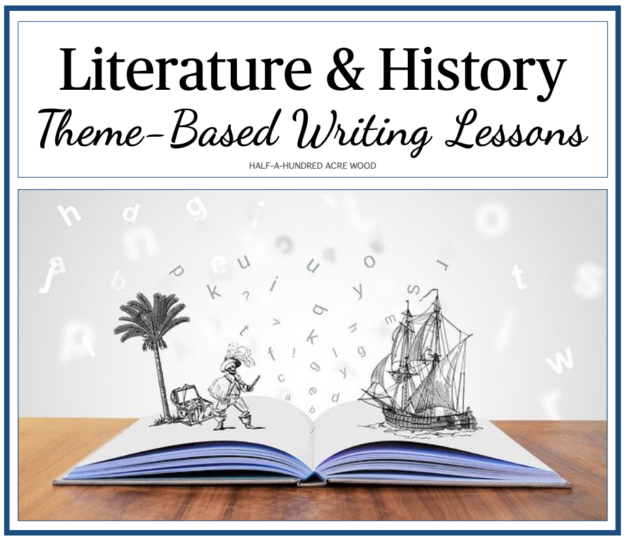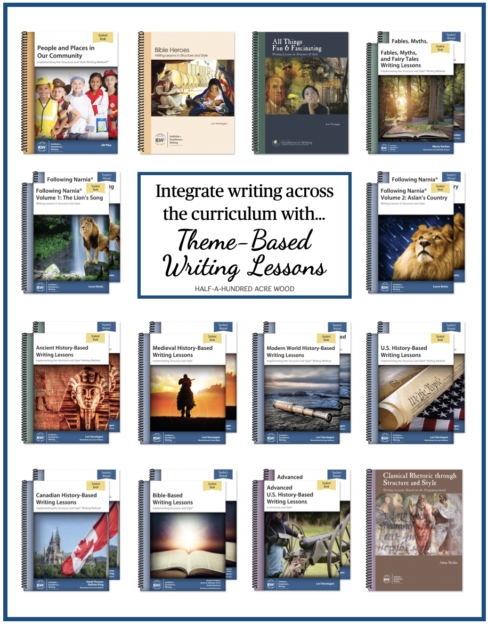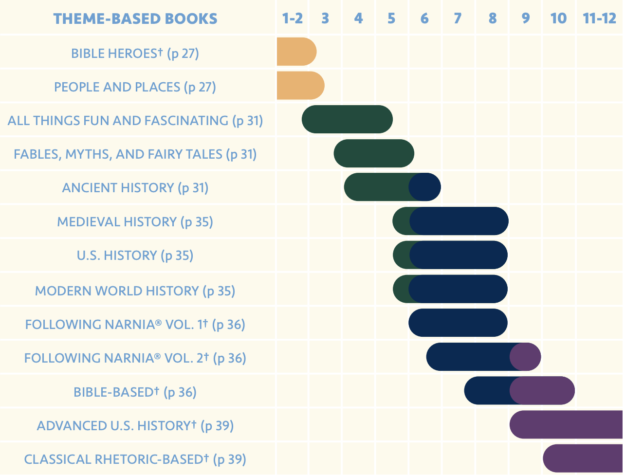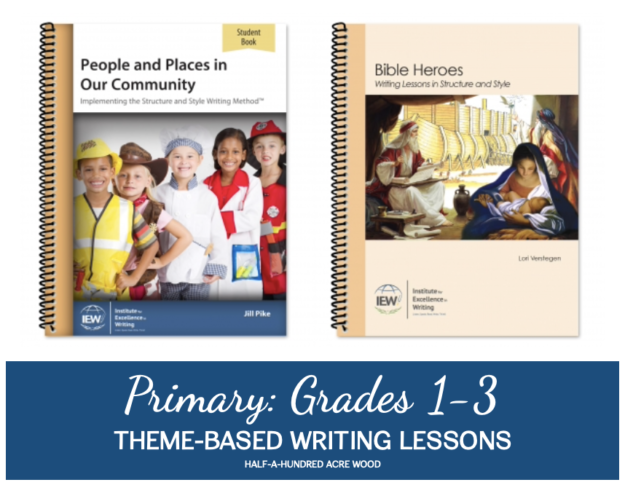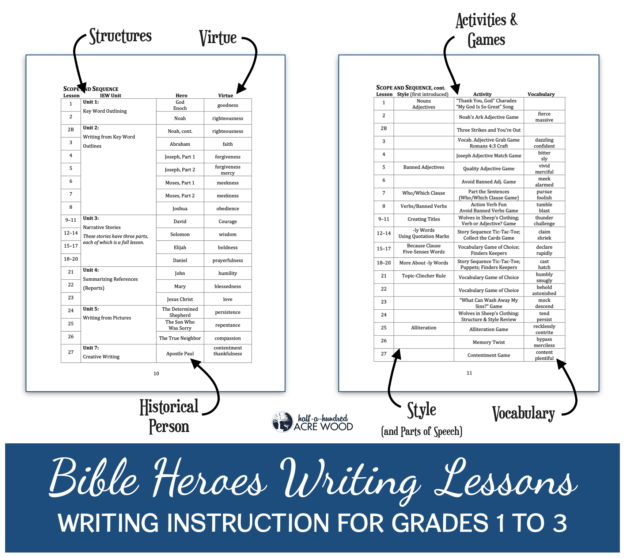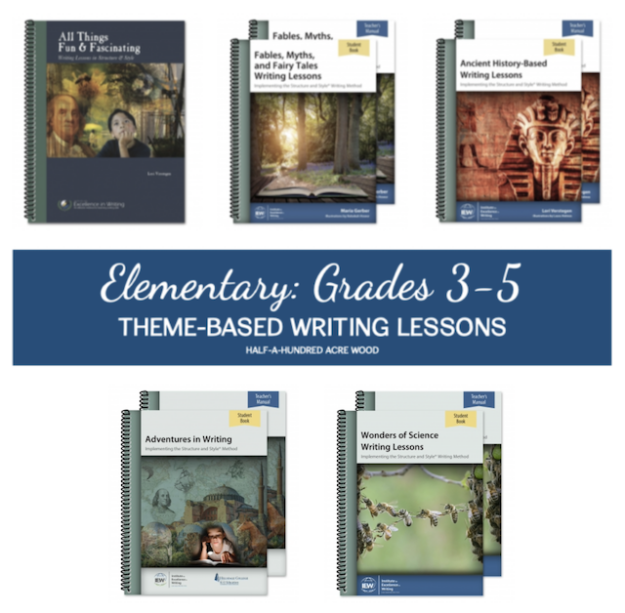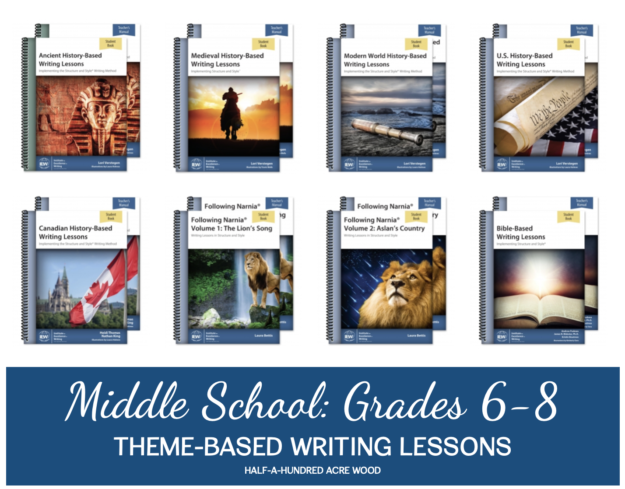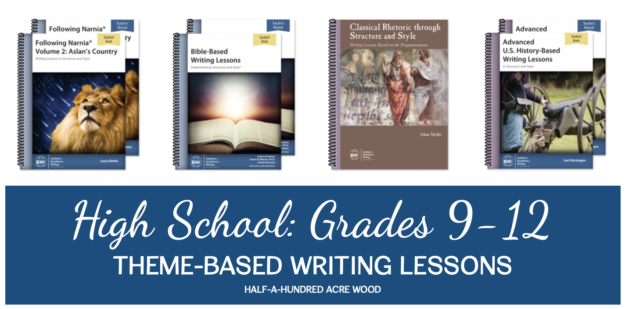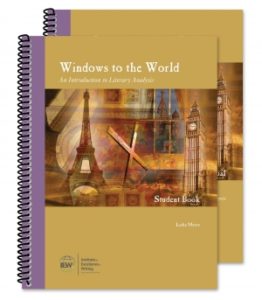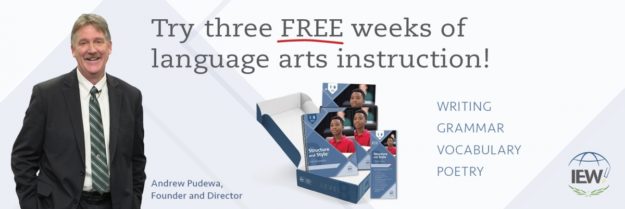Years ago, our family participated in a classical homeschool program that introduced us to history-based writing lessons from IEW. It was not until we headed in a new direction that we discovered the vast assortment of excellent resources available from IEW – all the way through high school – even within the narrow category of theme-based writing lessons!
Theme-based writing lessons are non-video courses designed for use by teachers/parents who have been through the Teaching Writing: Structure and Style seminar or for students who have been through Structure and Style for Students. These themed workbooks guide students through composition while integrating history and/or literature into the writing prompts and source texts.
Theme-based writing lessons automatically reinforce our other learning in history or literature as we integrate writing assignments related to that same content area. For example, we’ve used Ancient History-Based Writing Lessons or Fables, Myths, and Fairy Tales when we’ve focused on the ancient civilizations and world cultures within Mission World Wonders (a study of world missions, geography, history, science, and fine arts). We’ve used Modern World History-Based Writing Lessons while studying the reformation through 20th century communism in Mission Faith Forgers. And we’ve used U.S. History-Based Writing Lessons – and the more challenging high school version, Advanced U.S. History-Based Writing Lessons – while studying American history and geography in Mission Lasting Liberty. Incorporating theme-based writing lessons into our studies has provided a deeper learning experience, making the history and cultural stories more memorable overall.
The nine structural units of IEW’s Structure and Style Program include:
- Note-taking and Outlines
- Writing from Notes
- Retelling Narrative Stories
- Summarizing a Reference
- Writing from Pictures
- Summarizing Multiple References
- Inventive Writing
- Formal Essay Models
- Formal Critique and Responses to Literature
Theme-based writing lessons for the younger grades introduce the first 6-7 structural units using simpler source texts and assignments, but students eventually progress to writing research papers and timed response-to-literature essays in high school. Each option includes vocabulary and stylistic techniques such as quality adjectives, strong verbs, and various sentence structures, as well as in-depth explanations, brainstorming prompts, tips for teaching, checklists, and other notes.
Because our family has so enjoyed some of the lesser-known editions of this curriculum, we wanted to take a moment to provide an overview of all the theme-based writing options available for Grades 1 through 12. (Those with an asterisk are options we have used and recommend.) Try Free Theme-Based Writing Lessons.
The Short List by Grade
Primary: Grades 1-3
Bible Heroes Writing Lessons* (with purchase of student book, free teacher ebook)
People and Places in Our Community (with purchase of student book, free teacher ebook)
Elementary: Grades 3-5
Adventures in Writing
Wonders of Science
Fables, Myths, and Fairy Tales Writing Lessons*
Ancient History-Based Writing Lessons*
Middle School: Grades 6-8
Following Narnia® Volume 1: The Lion’s Song
Following Narnia® Volume 2: Aslan’s Country
Wonders of Science
Investigations in Writing
Ancient History-Based Writing Lessons*
Medieval History-Based Writing Lessons*
Modern World History-Based Writing Lessons*
U.S. History-Based Writing Lessons*
Canadian History-Based Writing Lessons
Bible-Based Writing Lessons
High School: Grades 9-12
Following Narnia® Volume 2: Aslan’s Country
Bible-Based Writing Lessons
Classical Rhetoric through Structure and Style®*
Advanced U.S. History-Based Writing Lessons*
Windows to the World: An Introduction to Literary Analysis*
Primary Theme-Based Lessons (Grades 1-3)
Bible Heroes Writing Lessons (free teacher ebook with purchase of student book). Students in Grades 1 to 3 learn about great men and women of the Old and New Testaments while focusing on character traits such as courage, faith, and humility. This resource includes discussion starter ideas, activities and games for teaching vocabulary and reinforcing stylistic techniques (with parts of speech!), and sample key word outlines as it introduces six of the nine IEW structures of writing – including taking notes and writing stories and reports. With its focus on virtue and its incorporation of learning through games, this has been a favorite resource in our family! Download a sample: Student Sample.pdf | Teacher Sample.pdf
People and Places in Our Community (free teacher ebook with purchase of student book). Students in Grades 1 to 3 become acquainted with the roles of carpenters, librarians, firefighters, mail carriers, and other workers in the community while learning to write key word outlines, reports, and short stories with this resource which covers IEW’s first six structural units. The student book includes engaging source texts with illustrations, blank outlines and checklists, and illustrated vocabulary cards with review game ideas. Purchasers of the student book receive not only a free teacher ebook but also a complimentary digital copy of the Student Resource Packet. Download a sample: Student Sample.pdf | Teacher Sample.pdf
Adventures in Writing. While learning to take notes, retell stories, compose paragraphs, and write mini research reports, students in 3rd grade explore topics from history, geography, literature, and science with a special emphasis on adventure, invention, and exploration. Download a sample: Student Sample.pdf | Teacher Sample.pdf
Elementary Theme-Based Lessons (Grades 3-5)
Fables, Myths, and Fairy Tales Writing Lessons. Students in Grades 3 to 5 work through the first seven writing structures, learning stylistic techniques and vocabulary as they take notes, summarize stories, write reports, and compose letters using content from classic fables, myths, and fairy tales from around the world. As an added bonus, learn to say “hello” in over twenty-five different languages and cultures. Includes vocabulary cards, literature suggestions, and access to helpful PDF downloads such as the Student Resource Packet. This particular program gave us a fantastic break from our normal history-based writing lessons, allowing us to explore more imaginative topics in our writing. Download a sample: Student Sample.pdf | Teacher Sample.pdf
Ancient History-Based Writing Lessons. Students in Grades 4-7 learn all nine structural units in this course which teaches how to take notes, summarize references, organize essays, compose stories, construct critiques, and write responses to literature. This curriculum explores ancient history and literature including notable places and events, myths and legends, and accounts of famous persons and events of the ancient world. This curriculum includes vocabulary, stylistic techniques, literature suggestions, and helpful PDF downloads. Download a sample: Student Sample.pdf | Teacher Sample.pdf
Adventures in Writing. While learning to take notes, retell stories, compose paragraphs, and write mini research reports, students in 3rd grade explore topics from history, geography, literature, and science with a special emphasis on adventure, invention, and exploration. Download a sample: Student Sample.pdf | Teacher Sample.pdf
Discoveries in Writing. While learning to take notes, retell stories, compose paragraphs, and write mini research reports, students in 4th grade explore topics from history, geography, literature, and science with a special emphasis on adventure, invention, and exploration. Download a sample: Student Sample.pdf | Teacher Sample.pdf
Frontiers in Writing. While learning to take notes, retell stories, compose paragraphs, and write mini research reports, students in 5th grade explore topics from history, geography, literature, and science with a special emphasis on adventure, invention, and exploration. Download a sample: Student Sample.pdf | Teacher Sample.pdf
Wonders of Science. Students in Grades 4 to 7 explore science-themed topics such as insects, inventions, and scientists as they learn to outline paragraphs, retell stories, summarize references, and write reports, essays, and critiques. Includes vocabulary, literature suggestions, and helpful PDF downloads. Download a sample: Student Sample.pdf | Teacher Sample.pdf
Middle School Theme-Based Lessons (Grades 6-8)
Ancient History-Based Writing Lessons. Students in Grades 4-7 learn all nine structural units in this course which teaches how to take notes, summarize references, organize essays, compose stories, construct critiques, and write responses to literature. This curriculum explores ancient history and literature including notable places and events, myths and legends, and accounts of famous persons and events of the ancient world. This curriculum includes vocabulary, stylistic techniques, literature suggestions, and helpful PDF downloads. Download a sample: Student Sample.pdf | Teacher Sample.pdf
Wonders of Science. Students in Grades 4 to 7 explore science-themed topics such as insects, inventions, and scientists as they learn to outline paragraphs, retell stories, summarize references, and write reports, essays, and critiques. Includes vocabulary, literature suggestions, and helpful PDF downloads. Download a sample: Student Sample.pdf | Teacher Sample.pdf
Investigations in Writing. Students in Grades 6-8 investigate a variety of topics including cartography, the Dead Sea, Vivaldi, Socrates, the Amazon Rainforest, the French Revolution, Volcanoes, and more. Download a sample: Student Sample.pdf | Teacher Sample.pdf
Medieval History-Based Writing Lessons. Students in Grades 6 to 8 work through all nine structural units in this course which uses historical persons, events, and literature from the Middle Ages to teach note-taking and oral reports, summarizing references, organizing essays, retelling stories, constructing critiques, and writing responses to literature. Source texts include monasteries, Justinian the Great, Beowulf, Mohammed, Charlemagne, vikings, cathedrals, knights, the Renaissance, Genghis Khan, and more. Includes vocabulary cards, literature suggestions, and access to helpful PDF downloads. Download a sample: Student Sample.pdf | Teacher Sample.pdf
Modern World History-Based Writing Lessons. Students in Grades 6 to 8 experience world history through famous people, events, and literature with source texts on topics such as the printing press, the Age of Exploration, the French Revolution, Boer Wars, inventions of the Industrial Age, communism around the world, Churchill, Sherlock Holmes, and stories from modern world cultures. These lessons include all nine structural units along with vocabulary cards, literature suggestions, and access to helpful PDF resources – and the Teacher’s Manual includes sample student essays, simplified source texts, advanced source texts, teaching tips, and answer keys. Download a sample: Student Sample.pdf | Teacher Sample.pdf
U.S. History-Based Writing Lessons. Students in Grades 6 to 8 write their way through American history through engaging source texts on the colonization of America, the American Revolution, the founding fathers, westward expansion, the Civil War, the Transcontinental Railroad, World War I, and more. These lessons include all nine structural units along with vocabulary cards, literature suggestions, and access to helpful PDF resources – and the Teacher’s Manual includes sample student essays, simplified source texts, advanced source texts, teaching tips, and answer keys. Download a sample: Student Sample.pdf | Teacher Sample.pdf
Canadian History-Based Writing Lessons. Students in Grades 6 to 8 experience Canadian history through the study of famous people and events from Canadian history. These lessons include all nine structural units along with vocabulary cards, literature suggestions, and access to helpful PDF resources – and the Teacher’s Manual includes sample student essays, simplified source texts, advanced source texts, teaching tips, and answer keys. Download a sample: Student Sample.pdf | Teacher Sample.pdf
Following Narnia® Volume 1: The Lion’s Song. Students in Grades 6 to 8 experience writing through the enchanted land of Narnia using the first three novels from The Chronicles of Narnia® (The Magician’s Nephew; The Lion, the Witch and the Wardrobe; and The Horse and His Boy). The student book provides reading assignments from the novels as well as source texts on related topics such as Sherlock Holmes, Atlantis, Buckingham Palace, World War II evacuations, Adolf Hitler, chores, and the pitcher plant. Simply fantastic! Includes a complimentary digital copy of the Student Resource Notebook. Download a sample: Student Sample.pdf | Teacher Sample.pdf
Following Narnia® Volume 2: Aslan’s Country. Students in Grades 8 to 12 continue their writing journey through the remaining novels of The Chronicles of Narnia® (Prince Caspian, The Voyage of the Dawn Treader, The Silver Chair, and The Last Battle). Recommended for students with at least one year of experience with IEW, this book continues into more advanced assignments using the Structure and Style method. It includes source texts on related topics such as Aristotle, Ulysses, Charles Dickens, tidal pools, and Gothic architecture. In addition to everything within the Student Book, the Teacher’s Manual includes in-depth instructions, including sample outlines, brainstorming ideas, and answers to questions. Includes a complimentary digital of the Student Resource Notebook. Download a sample: Student Sample.pdf | Teacher Sample.pdf
Bible-Based Writing Lessons. Students in Grades 6 to 12 enhance their understanding of Scripture using passages from the Old and New Testaments as a basis for source texts – with writing assignments on the flood, Proverbs, Queen Esther, the Miracle at Cana, the Prodigal Son, the Parable of the Talents, The Good Samaritan, Saul’s conversion, foreshadowing in the Bible, Christian responsibilities, and more. Includes literature suggestions, vocabulary cards, and a complimentary digital copy of the Student Resource Packet. Download a sample: Student Sample.pdf | Teacher Sample.pdf
High School Theme-Based Lessons (Grades 9-12)
Following Narnia® Volume 2: Aslan’s Country. Students in Grades 8 to 12 continue their writing journey through the remaining novels of The Chronicles of Narnia® (Prince Caspian, The Voyage of the Dawn Treader, The Silver Chair, and The Last Battle). Recommended for students with at least one year of experience with IEW, this book continues into more advanced assignments using the Structure and Style method. It includes source texts on related topics such as Aristotle, Ulysses, Charles Dickens, tidal pools, and Gothic architecture. In addition to everything within the Student Book, the Teacher’s Manual includes in-depth instructions, including sample outlines, brainstorming ideas, and answers to questions. Includes a complimentary digital of the Student Resource Notebook. Download a sample: Student Sample.pdf | Teacher Sample.pdf
Bible-Based Writing Lessons. Students in Grades 6 to 12 enhance their understanding of Scripture using passages from the Old and New Testaments as a basis for source texts – with writing assignments on the flood, Proverbs, Queen Esther, the Miracle at Cana, the Prodigal Son, the Parable of the Talents, The Good Samaritan, Saul’s conversion, foreshadowing in the Bible, Christian responsibilities, and more. Includes literature suggestions, vocabulary cards, and a complimentary digital copy of the Student Resource Packet. Download a sample: Student Sample.pdf | Teacher Sample.pdf
Classical Rhetoric through Structure and Style®. High school students learn to compose essays and persuasive arguments based on the Progymnasmata, a series of rhetorical exercises that began in Ancient Greece and Rome and are still used today for both composition and performance of oratory. Recommended for advanced high school students, this resource includes exercises to assist students in developing rhetorical and reasoning skills. (Our oldest son learned quite a bit from this course and greatly improved his writing in the process!) Includes a complimentary digital copy of the Student Resource Notebook. Download a sample: Classical Rhetoric Based Writing Sample.pdf
Advanced U.S. History-Based Writing Lessons. A much more challenging version of the lower level U.S. History-Based Writing Lessons, this resource leads high school students through advanced writing skills such as thesis statements, argumentative essays, persuasive essays, research papers, literary analysis, timed essays, and more. Students write about a variety of topics from U.S. History (from Explorers to Modern Times), including responses to the following works of literature: Uncle Tom’s Cabin by Harriet Beecher Stowe, To Kill a Mockingbird by Harper Lee, The Gardener by Sarah Stewart (a picture book), and The Boy on the Wooden Box by Leon Leyson. This course is designed for students with at least one year of experience with IEW at the high school level. (We highly recommend this program, as it will introduce students to almost any type of essay they will encounter in the future.) This book comes with a complimentary digital copy of the Student Resource Notebook. Download a sample: Student Sample.pdf | Teacher Sample.pdf
And… for those wanting to dive into literary analysis
This is not considered part of the theme-based writing lesson series, but we’d be remiss to leave it out! Windows to the World: An Introduction to Literary Analysis takes high school students through the process of analyzing elements of literature: setting, plot, characterization, imagery, allusions, irony, parallelism, tone, mood, theme, and more. It examines how to read literature (with annotations!) and provides multiple examples and templates for understanding literary devices, why they work, and how authors use them to move us. This course may be completed in a semester or a year. The purchase of this product includes a digital copy of A Syllabus for Introduction to Literary Analysis. Download samples:
- Windows to the World Student Sample.pdf
- Windows to the World Teacher Sample.pdf
- Syllabus for Intro to Literary Analysis Student Sample.pdf
- Syllabus for Intro to Literary Analysis Teacher Sample.pdf
100% Money-Back Guarantee
Because of IEW’s incredible 100% Money-Back Guarantee, we highly recommend purchasing products directly from IEW instead of through 3rd-party sellers.
Try out Writing, Spelling, Poetry, and Grammar Programs for Free!
We highly recommend checking out the first three weeks of Structure & Style for Students program from IEW. (You can access the first three weeks free.)
Other IEW programs you can try out for free include…
- Structure and Style for Students. If you’d prefer Andrew Pudewa to teach writing structure and style to your student(s), this program is for you! Download the first lessons from each level for teaching composition to children in grades 3-12.
- Fix It! Grammar. Download the first lessons of all four levels of this gentle introduction to grammar and mechanics with thorough yet simple instructions for the teacher.
- Introduction to Public Speaking. Download the first two lessons of this engaging program for learning to conquer the #1 fear of most people: public speaking.
- University-Ready Writing is a 12-week video-based course which teaches high school students advanced note-taking skills and writing techniques in preparation for college-level writing. Try it free here!
- Try Free Theme-Based Writing Lessons. Theme-Based Writing Lessons are for students and/or teachers familiar with IEW’s Structure and Style Program. Topics include science, history, literature, and Bible, covering a variety of grade levels.
- Linguistic Development through Poetry Memorization. Download the first five poems from this mastery approach to learning poetry.
- The Phonetic Zoo. Try a sample of a program that teaches spelling with an auditory approach towards mastery. (Requires free registration.)
- Free audio talks, booklists, and more! (Our favorite audio is Nurturing Competent Communicators.)
Visit IEW to find out more about other programs to transform your students into proficient writers – from early elementary all the way through college! You may also be interested in our favorite resources for teaching grammar and composition to students in grades 3-12.
*IEW product images are subject to copyright. Used with permission.

